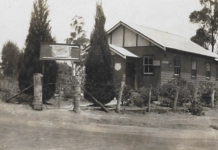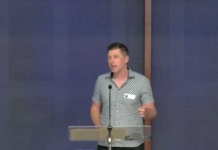
The National Church Life Survey has revealed that 30% of children who have been raised in Baptist Churches in Australia leave during their early teen years. The 2011 census data shows that across denominations churches are losing as many as 30,000 children each year, with more people leaving church between the ages of 10 & 14 than in any other stage of life. Many leave during the transition phase between primary and high school.
Do you have upper primary students in your church? The pattern over the last forty years would suggest that a third of them could leave, not just your church, but the Church altogether, before they are settled as teenagers in your youth ministry or adult service. Transitioning from primary to high school is a stressful time, and children of this age group are often given, for the first time, the option to decide whether or not to attend church. Children often find it easier to slip out at this critical stage than to forge their way into new friendships, programs and rhythms.
This is an urgent conversation for churches.
David Goodwin’s “Lost in Transition” thesis (available for free download from kidsreach.org.au) explores this very issue. Goodwin makes concrete recommendations, encouraging churches to strategize for smooth and successful transitioning. Many Baptist churches in NSW & ACT are drawing upon such recommendations to make intentional and thoughtful plans to support children in the transition from kids’ ministry to youth ministry. Here are some ideas from several of our churches to get you thinking about your own context.
Communicate
Early and clear communication with both children and parents is a top priority for smooth transitions. Children need to know well in advance what will happen once they graduate from kids’ ministry – what they can expect, who their new leaders will be, and when the changes will take place. Parents also need to know what the transition process looks like for their child. If parents feel invested in the transition, and understand the value of the youth ministry, support will come from within the family. Knowing this information in Term Four can aid families in timetabling after school activities so as not to clash with youth group times.
Bayside Community Church ensures their Year 6’s have a clear picture of what’s next. During Term Four, those who are about to make the transition visit the Sunday morning youth program, the Friday night youth program, and have lunch together with one of the kids and one of the youth leaders, where all their questions about the following year are answered. Green Point Baptist sends out personal invitations, so that children know the correct information and feel welcomed to the youth group.
Connect
Smooth transitions require strong relational connections between the leadership structures in your church. Children’s and youth leaders need to work together as a team, to help kids transition to the next stage.
Ettalong Baptist Church invite children to begin attending their Friday night youth program in Term Four of Year 6, to allow a full term for relationships to build before the youth group becomes their primary community. On the other hand, Berry Community Church keep their Year 7’s as part of the children’s program until around week six of Term One. The youth pastor visits regularly to build relationships, and then they all move up to the youth group together. Both approaches recognise that the long summer holidays are an easy exit point for children to slip out quietly without being noticed, if they aren’t feeling comfortable with the group they are expected to join in the new year.
Create
The Here2Stay research (here2stay.org.au) describes “rites of passage” as one of the pillars of lifelong faith formation. Many cultures are rich in significant events which acknowledge the development of young people, but in Western culture we sometimes need to create our own. The transition between primary and high school is an important landmark in the life of an adolescent, and is a great opportunity to create a meaningful rite of passage.
Mosaic Baptist Church has introduced a memorable experience to mark this important transition for their Year 6’s. The children hike up a mountain with the kids’ leaders, where the youth leaders and parents are waiting at the top. Each child receives letters from parents, kids’ leaders and other significant adults affirming who God has created them to be and what they see in them. They have morning tea together, and then the kids walk down the mountain with their new youth leaders.
Wyong Baptist Church hosts a special graduation dinner for the Year 6’s, where they are presented with a Bible. On the first week of the new year, the children’s leaders walk the new Year 7’s over to youth group, where the older youth welcome them with confetti guns! This is an annual tradition, that lets the new kids know that they are welcome in the new group.
Challenge
Research shows that if children enjoy their time in church as a child, they are more likely to transition well into youth and adult ministry. Yet as Year 6’s rapidly mature as they prepare for high school, they can feel in their final months that they are too old for kids’ ministry. Churches can help by looking out for opportunities to stretch and challenge children in upper primary.
Georges River Life Church is hoping to launch a kids’ leadership ‘intern program’ for children in Year 5 & 6. An internship would combine course material with skill based training, as well as opportunities to serve, share and lead. At Parramatta Baptist Church, children join with the adults during the school holidays, and older children are given an activity sheet which trains them to engage in the service and listen to the sermon (e.g. Which was your favourite song from today’s service? What passage of the Bible are we looking at today? Were any stories told? What did you learn?)
Goodwin’s research also talks about preparing children for the inevitable challenges which will come to their faith in older years. No matter how few or how many children attend your church, interested adults can initiate conversations with older children that engage and take seriously the questions that they have regarding faith.
The stakes are high. Up to a third of our children will not make the transition to youth ministry unless we make it a priority to help them stay. What can you do in your church to help kids continue in lifelong faith?




































